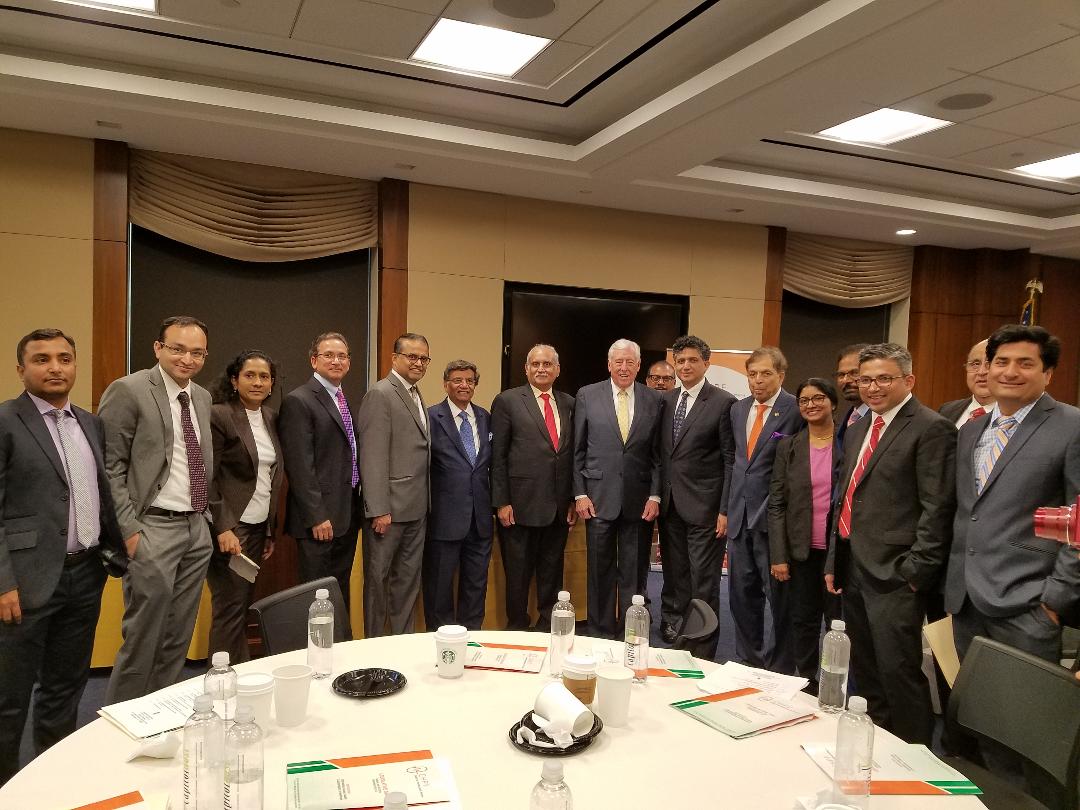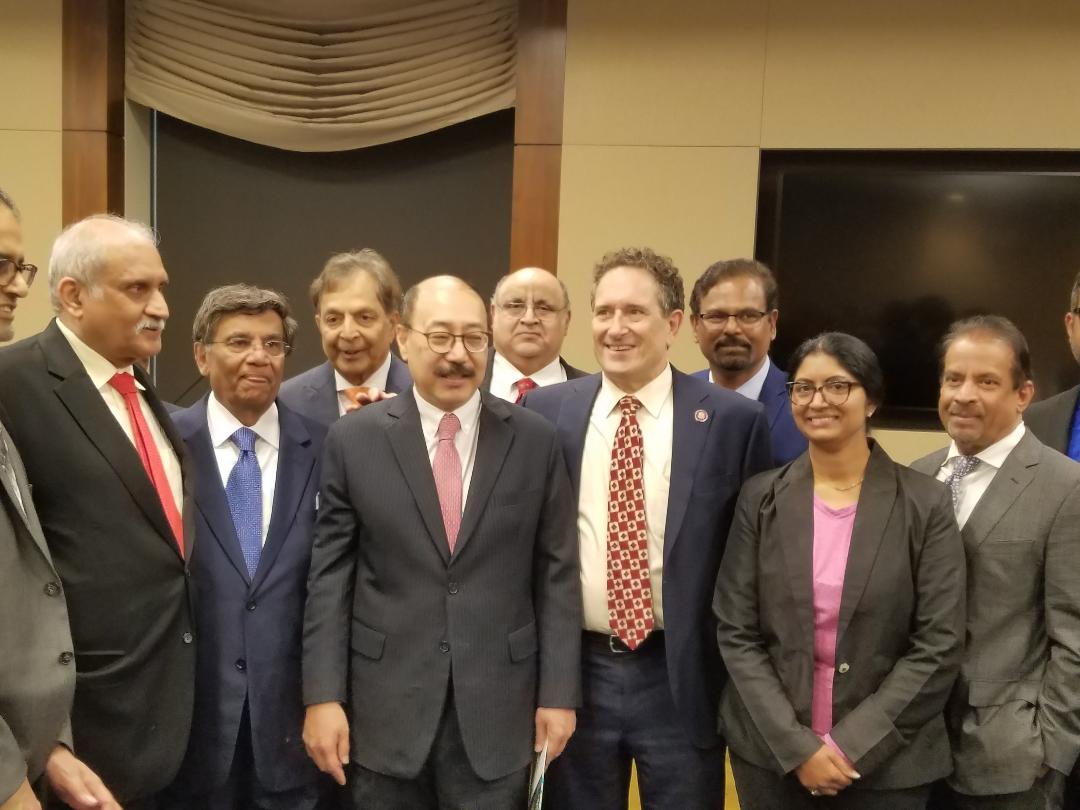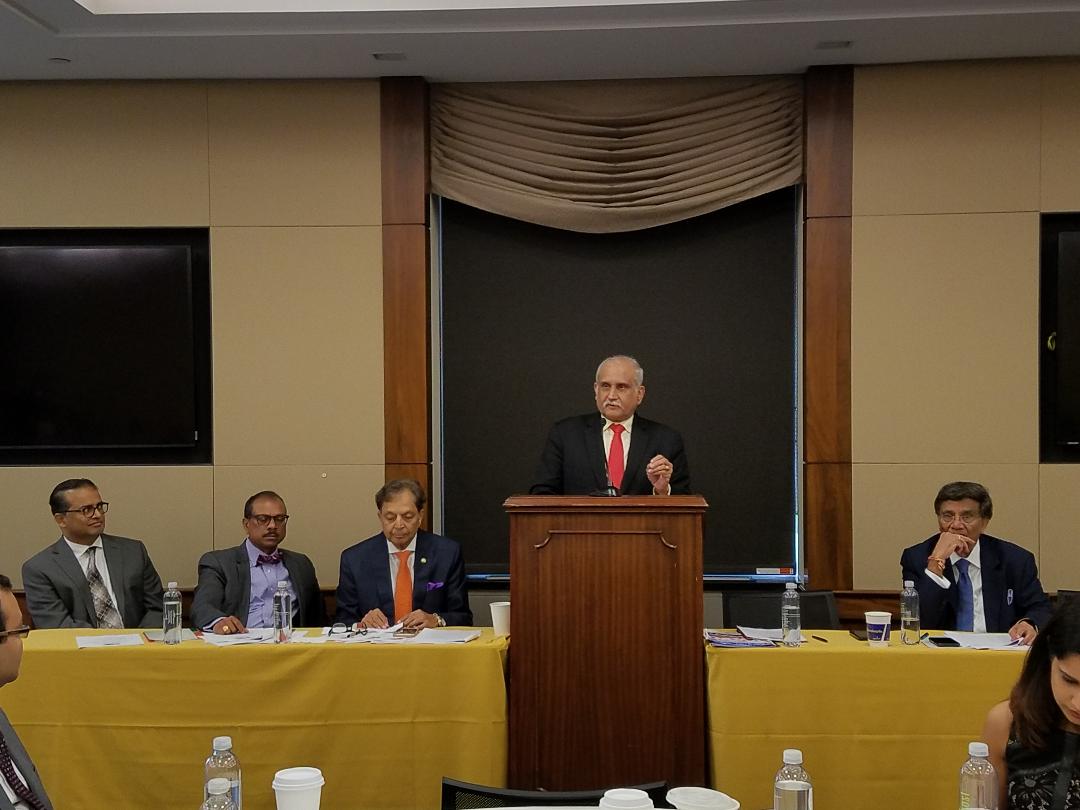Immigration Reform and Physicians Shortage Takes Center Stage at AAPI Legislative Day
US Lawmakers Praise AAPI’s Growing Clout in Advocating for Effective Health Care in US
Healthcare continues to be at the center of the national debate, especially after the Trump Administration’s efforts to dismantle Affordable Care Act, and to do away with the Individual Mandate, affecting almost everyone in the country. Association of American Physicians of Indian Origin (AAPI), the largest ethnic organization of physicians, representing over 100,000 physicians of Indian origin, wants to make their voices heard on Capitol Hill and around the nation, particularly on issues relating to healthcare.
Indian-Americans constitute less than one percent of the country’s population, but they account for nine percent of the American doctors and physicians. One out of every seven doctors serving in the US is of Indian heritage, providing medical care to over 40 million of US population.
AAPI leaders and members brought to the fore some of the major concerns of the Indian-American community, particularly those affecting the physicians and their patients during AAPI’s Legislative Day on Capitol Hill, Washington, D.C., on April 30th, 2019.
Attended by several key leading Congressmen and women from both the major political parties, the event held at the Rayburn House Office Building, highlighted key issues affecting physicians and the country in general. House Majority Leader, Rep. Steny Hoyer (D-MD), Rep. Ami Bera, (D-CA); Rep. Raja Krishnamoorthi, (D-Illinois); Rep. Tulasi Gabbard (D-HAWAI) , Rep. Michael Guest (R-MS); Rep. Joe Wilson (R-SC); Rep. Frank Pallone (D-NJ); Rep. Phil Roe, MD (R-TN); Rep. John Sarbanes (D-MD); Rep. Andy Harris, MD (R-MD) and several other leading lawmakers addressed the AAPI delegates and listened to their concerns and promised support.
A White Paper outlining the concerns of the fraternity was submitted to lawmakers who addressed the delegates. Some of the issues outlined in the White Paper included, Increased Residency Slots, Immigration Reform, Medicare and Medicaid Reimbursements, Tort Reform, Repeal of the Individual Mandate, Lowering the Cost of Prescription Drugs, and, The South Asian Heart Health Awareness and Research Act of 2017.
In his welcoming remarks, Dr. Naresh Parikh, President of AAPI, stressed the importance of young physicians in AAPI, who are the “future of AAPI.†He highlighted the efforts of the current team under his leadership†to make AAPI financially sound and stable for the years to come.â€
"We are pleased with the enormous turnout of both AAPI members and the showing of bipartisan members of Congress at this year's Legislative Day," said Dr. Parikh, AAPI President. "It is a testament to the strength of AAPI's reputation as strong leaders, with our physicians proudly serving as health care providers in all 50 states. With this event, we are building a strong foundation for future advocacy and legislative successes at both the federal and state level," said Parikh.
In his opening remarks, AAPI Legislative Chairman – Dr. Vinod K. Shah, said, “AAPI is once again in the forefront in bringing many burning health care issues facing the community at large and bringing this to the Capitol and to the US Congress. This is an exciting time for Indo-US relations. Each of us, as part of AAPI, the largest ethnic organization, representing over 8,0000 Indian American Physicians have a unique role to play in strengthening the relationship between India, the largest democracy and the US, the greatest democracy in the world.â€
Dr. Vinod Shah, who immigrated to the US 55 years ago, shared his own inspiring personal experiences, as to how he began his career as a cardiologist in a tiny remote region over a half a century ago, and today, he is proud to own and manage a series of large clinical practice serving millions of people across the state of Maryland.
"This immensely successful event, including our partnership with the Indian Embassy, has showcased AAPI's strength relationship building and maintaining ties with our elected officials," said AAPI Legislative Co-Chair – Dr. Sampat Shivangi. He emphasized “AAPI contributions in issues like lowering drug costs, strong advocacy on Immigration reforms, especially for physicians working in rural areas of the US and their long decades of waiting in acquiring Green Cards.â€
Dr. Shivangi, a veteran of several decades of service to AAPI and to the nation, highlighted the “many important issues that were discussed at the event, including the need to increase in Residency slots, Medicare and Medicaid reimbursements issues. Dr. Sampat Shivangi raised the issue of US-India trade relations, especially President Trump’s remarks where he has called India as king of Tariffs, with several U S congressmen. Dr. Shivangi emphasized the importance of public awareness to discuss this issue, among others, to do away with some misgivings, with the help of think tanks and open dialogue with experts on this issue. .
In his keynote address, Ambassador Hon Harsh Vardhan Shringala praised AAPI’s lobbying efforts on some of the issues affecting the broader Indian American community and other immigrant groups is also a testament to its growth and reach. Being one of the oldest Indian American organizations, it’s also among the most influential, as was evident from the number of members of Congress who took time out of their busy schedule to address the group.
"I believe all of you will have an important role to play in contributing to this. All of you in a sense are permanent Ambassadors here. You have an understanding of the US. You have an understanding of India and Indian society. So based on this understanding and the network that you have you will be in a position to take forward this relationship in different areas," the Indian Envoy said.
Jason Marino – American Medical Association Senior Assistant Director, AMA Congressional Affairs, emphasized the need for more collaborative efforts between AAPI and AMA to have greater voice in healthcare policy making efforts on Capitol Hill.
In a detailed Report on Green Card delays affecting Indian American physicians, the Green Card Backlog Task Force pointed out that there are over 10,000 Physicians waiting for Green Card for decades. AAPI members would like to see the Green Card backlog addressed, which it says has adversely impacted the Indian American community. They stressed the need for bipartisan support to pass the Bill S-948 that will provide Green Cards to those serving in America’s under-served and rural communities. The measure has garnered support from leading members of the Congress and seeks to remove the 7 percent cap on Green Cards on every country regardless of their size. It “will address many of the concerns facing the Indian American community,†AAPI said in its list of demands.
The bipartisan members of Congress discussed ways to reform health care delivery, to ensure its cost-effectiveness, and the negative effects of defensive medicine, which has driven up the cost of health care. AAPI members told the gathering of both Republican and Democratic congressmen how important it was to increase the number of residency positions to address the upcoming physician shortage.
According to AAPI, there is an ongoing physician shortage, which affects the quality of care provided to American patients. There are patients who face lengthy delays in various specialties, a situation which will worsen over time. Legislation was introduced in previous sessions of Congress that would add 15,000 residency slots, training up to 45,000 more physicians, AAPI points out in its White Paper. “By adding more residency positions today, Congress can train more physicians to treat patients in the future,†AAPI stated.
Rep. Steny Hoyer underscored the need for reforming the entire immigration process and make it equitable and fair. “We need to deal with the issue of H-1B and J-1 visas†and expand opportunities for highly skilled foreign workers and students, he told the gathering. “I still believe and always will that the United States will continue to grow. We need the best, the brightest and the bravestâ€, he said.
About India-US relations, Hoyer, affirmed, “I believe it is the most important alliance of this century. We are in the second decade and we have seen incredible progress. I know that will continueâ€, he said referring to shared values including a dedication to the rule of law and democracy.
Rep. Krishnamurthy, who is a physician himself praised AAPI’s leadership’s lobby Day for all Americans. “You are very influential and we very much appreciate and we look to your guidance on healthcare policy and programs,†he told a packed audience of American leaders and members. Reminding them that he is aware of the many issues affecting the physician community, the Indian born Congressman said, “You touch the lives of 13 percent of Americans, while serving 1 out of every 7 patients.†The powerful orator urged AAPI leaders to continue their civic engagement, encouraging them to consider running for political office. “If you dream it you can achieve it,†he told AAPI delegates.
Rep. Ami Bera pointed to the strides the Indian community has made in the past few decades. “It took less than a decade to have four Indian Americans in the US Congress,†he said. Describing it as the “natural progression to be part of the success story of USA,†he urged for the need to have more physicians of Indian origin to be in US Congress. He pointed to the Bill in the US seeking to elevate the relationship between India and the US to the next level. Endorsing his whole hearted support for Green Cards for physcians, he said, “We should give them Green Card with their Diplomas.â€
Rep. Joe Wilson shared about his lkong association with India. He praised India’s vibrant . democracy and told of his dad’s visit to the Taj Mahal in 1944. Endorsing AAPI’s demand for more H1/J1 visas, he said, “we need more Doctors to serve our patients.†Rep. Dan Taylor from Texas lauded the fast growing Indian community in Texas and was appreciative of the contributions of Indian Americans.
Rep. Frank Pallone told of the large number of Indian Americans, 353000 in his home state, New Jersey, which is the 3rd highest in the nation, among whom are 120000 in his district. He offered whole hearted support for AAPI’s demand for increased Residency slots with no cap on country-based Green Card.
Rep. Andy Barr from Kentucky pointed to physicians shortage in rural areas is acute and of the shortage of 120,000 by 2030. “We need to come together on Green Card/J1-H1 Visas based on skills.†Rep. John Sarbanes said, “I want to salute AAPI for your advocacy. No one rivals you in medicine. Healthcare remains a central to public policy and is challenging. Need to strengthen ACA. Your presence makes a huge difference.â€
Rep. Tulsi Gabbard of Hawaii, the first Hindu lawmaker to serve on Capitol Hill and current Democratic co-chair of the House India Caucus, told the AAPI gathering, “It’s been wonderful to see over the almost six years that I’ve been here in Congress how the relationship between our two countries has progressed. It has only continued to grow stronger and stronger. The commitment to continuing that momentum exists between both Democratic and Republican members of Congress and we’ve seen it cross between a Democratic administration and now a Republican administration,†she said.
Nissim Reuben – American Jewish Committee (AJC) Assistant Director: Asia Pacific Institute called to make strategic alliance and network with Lawmakers “trading the good will†between India and Jews to politically supportive of India’s favor, harnessing the good will Israel has for the benefit of India and the NRIs.
Nuala Moore – American Thoracic Society Associate Director, Government Relations and David Bryden & TB Advocacy Officer, shared about the efforts in eradicating TB in India and across the globe. With 8,000 new cases of TB everyday in India, they pointed to the United Nations Meeting where India’s Prime Minister Modi committed to the goal of eliminating TB by 2025, through education by involving Bollywood stars.
Joel Anand Samy Co-Founder and President, International Leaders Summit invited AAPI leaders to join in at the 4th summit to be held in Jerusalem in November this year, which will strengthen the strategic alliance between USA and India.
Kapil Sharma, Esquire Vice President, Government and Public Affairs, Wipro North America, pointed out that Wipro has donated $7 Billion, making it the 4th largest Foundation, and Azim Premji is today the biggest philanthropist outside of India. Highlighting the tremendous work the Indian companies do in the US, he stressed “for the need to recognize and appreciate our contributions in our adopted country. The US need to acknowledge what our contributions are to the US, especially investing in terms of money, man power, community services. He called on AAPI to to collaborate with WIPRO in its efforts for in-service teaching.
Dr. Sudhakar Jonnalagadda, Vice President of AAPI hopes that “AAPI will discover her own potential to be a player in shaping the health of each patient with a focus on health maintenance than disease intervention. To be a player in crafting the delivery of health care in the most efficient manner. To strive for equality in health globally.â€
“AAPI has been seeking to collectively shape the best health care for the people of US, with the physician at the helm, caring for the medically underserved as we have done for several decades when physicians of Indian origin came to the US in larger numbers,†said Dr. Anupama Gotimukula, Secretary of AAPI, said.
Later in the evening, Ambassador Hon Harsh Vardhan Shringala hosted a dinner in honor of AAPI delegates and guests, where he recognized AAPI ‘s contributions. Dr.Naresh Parikh, Dr. Vinod Shah and Dr. Sampat Shivangi thanked the Ambassador and assured to continue to work in co operations with the Embassy to strengthen US-India relationships.
The growing influence of doctors of Indian heritage is evident, as increasingly physicians of Indian origin hold critical positions in the healthcare, academic, research and administrative positions across the nation. With their hard work, dedication, compassion, and skills, they have thus carved an enviable niche in the American medical community. AAPI’s role has come to be recognized as vital among members and among lawmakers.
“We had a very fruitful discussion and we are very hopeful that Congress will act on the issues raised in our white paper,†Dr. Parikh, President of AAPI, summarized the day long event and the impact it has for the future of the growing Indian American community, healthcare providers and the healthcare industry. For more information on AAPI and its programs and initiatives, please visit: www.aapiusa.org 

